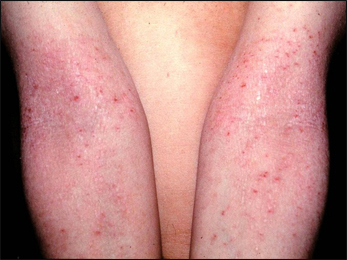Usually we are not much concerned about our skin, but skin diseases are enough to make our condition worse. Nothing could be more annoying and disgusting than skin itching. Atopic dermatitis – a skin disease which is characterized by the symptoms like itching, skin redness, dry patches, raised lumps on skin. This disease commonly occur in the children but can also affect the people of all age groups.
From the treatment point of view, there is need to pacify the pitta dosha in order to enhance the body’s digestion. It helps in cleansing of body by the elimination of toxins. On the other hand there are various herbs present in Ayurveda which are very effective to pacify the aggravated pitta dosha. Use of herbs like Amla (Emblica officinalis), Haritaki (Terminalia chebula), Bahera (Terminalia bellerica), Vacha (Acorus calamus), Neem (Azadirachta indica), Manjishta (Rubia cordifolia), Katuki (Picrorrhiza kurroa), Giloy (Tinopsora cordifolia), Daruhaldi (Berberis aristata), Manjistha (Rubia cordifolia) and Pitta papda (Fumaria officinalis) is quite useful in the treatment of atopic dermatitis. Hence the Ayurvedic treatment for atopic dermatitis is very useful way to manage this disease.
What is atopic dermatitis?

Atopic dermatitis (eczema) is the skin disease which may due to the bacterial infections, irritants or allergen. It is disease which is characterized by the red and itchy skin. It is mostly occur in the children but may also persist into adolescence and adulthood.
Symptoms of Atopic Dermatitis
Signs and symptoms may vary from person to person and include:-
- Itching, which can be severe, at night especially.
- Red to brownish-gray patches, especially on the neck, upper chest, eyelids, inside the bend of the elbows hands, feet, ankles, wrists, and knees. In the case of infants, these patches form on face and scalp.
- Burning sensation or pain on the skin.
- Skin becomes dry, red, scaly, thickened and rough.
- Fissures in the skin.
- Inflammation of the skin.
- Lumps formed on skin and there is the leakage of fluid.
Ayurvedic View
In Ayurveda, Atopic dermatitis (eczema) is called Vicharchika. In body there are basically three energies – vata, pitta and kapha which are responsible for healthy body. Imbalance of any of these energies result in the health issues. In this disease there is the aggravation of Pitta Dosha which results due to the impairment of digestion. Improper diet and lifestyle are the factors which lead to the impairment of digestive fire. Pitta gets manifested in the skin and leads to the accumulation of toxins (ama). These toxins contaminate the body tissue deeply and results in atopic eczema. The line of treatment works on pacifying Pitta by enhancing the body’s digestion, as well as cleansing the body of accumulated toxins.
